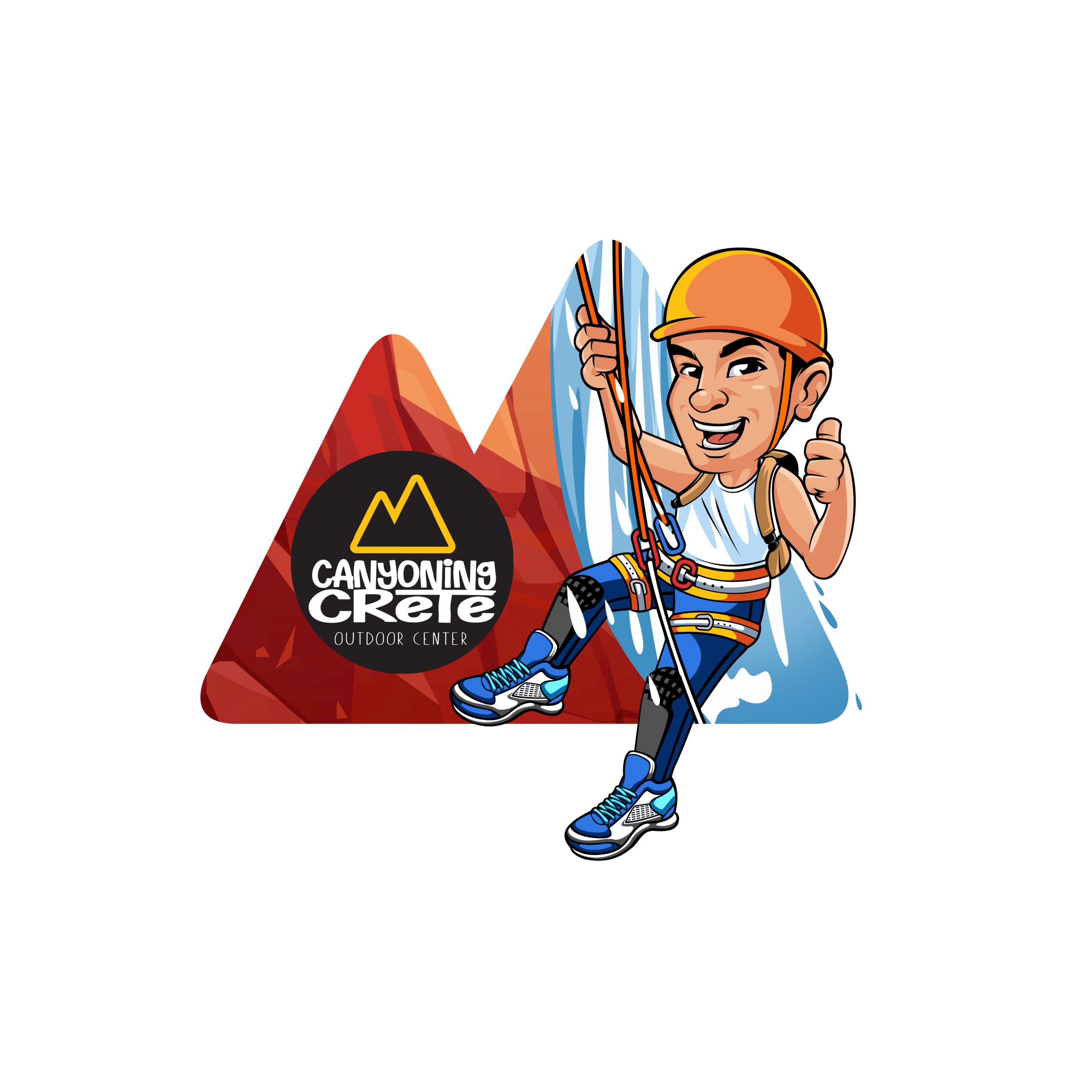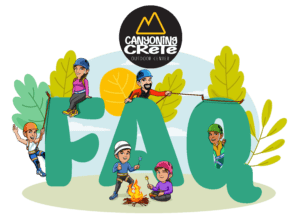Level 1 Beginner
With our extensive experience spanning many years and a strong foundation in outdoor activities, we are well-equipped to provide flexible educational programs that prioritize the personal growth and development of each individual student as well as the group as a whole. Our programs are tailored to cater to different skill levels and experiences, ensuring that participants are appropriately placed within suitable levels. We employ specific objectives and implementation methods, including theoretical instruction, demonstrations, assignments, and practical training. This comprehensive approach ensures a well-rounded learning experience that fosters both knowledge acquisition and hands-on skill development.

ACADEMY LEVEL 1 BEGINNER
Educational levels
- Initiation: Beginner canyoning Level 1
- Objective: Ιs to introduce trainees to the hidden world within canyons and provide them with the knowledge and skills required to safely navigate through technically challenging canyons of moderate difficulty. Trainees will gain hands-on experience with the specialized techniques and equipment necessary for canyoning. While the training covers essential technical skills, further specialization and development can be achieved through dedicated thematic modules that delve deeper into specific areas of interest for trainees.
- Duration: The training program is designed to provide participants with an immersive and comprehensive experience in the world of canyoning. With a duration of 5 days, the program offers a well-balanced combination of practical application and theoretical training. During the practical sessions, which span 4 days, participants will have the opportunity to explore various canyons in Crete. Through hands-on descents, they will gain valuable experience and become familiar with the specific techniques and equipment required for safely navigating technical canyons of moderate difficulty. The theoretical training, taking place on one afternoon, serves as an important complement to the practical sessions. This session allows participants to not only get to know each other but also delve into the essential theoretical aspects of canyoning, enhancing their overall understanding of the activity. It is important to note that the duration of the training may be adjusted based on factors such as the skill level of the group and prevailing weather conditions. This flexibility ensures that the program can be optimized to prioritize safety, learning, and the overall satisfaction of participants.
- Participants: The school welcomes individuals of all experience levels, provided they are at least 18 years old (written consent of guardian for minors) and in good physical condition, as verified by a medical certificate. Additionally, participants are required to have accident insurance coverage throughout the duration of the school. This ensures the safety and well-being of all participants during the canyoning activities. Regardless of previous experience, anyone meeting these requirements is eligible to participate and embark on an exciting journey into the world of canyoning.
- Certification: Upon successful completion of the training program, participants will be awarded the Canyoning Crete Outdoor Center certification. This certification serves as a testament to their acquired skills and knowledge in canyoning. It not only recognizes their achievements but also opens doors for further advancement in their canyoning journey. With this certification in hand, participants can pursue additional training opportunities at more advanced level schools, including autonomous canyoning, team leadership, and other specialized areas. The Canyoning Crete Outdoor Center certification sets the stage for participants to take their canyoning expertise to new heights and continue their exploration of this exhilarating outdoor activity.
- Technical equipment: Fully provided (helmet, belt, carabiners, ropes, etc.). You will only need your personal items (tent and sleeping bag if needed, backpack, clothing, appropriate shoes).
- Cost: The participation fee for the school is set at 300 euros, including VAT. It is important to note that this fee covers the cost of the training program itself and does not include expenses related to travel, accommodation, and food. However, participants will have the advantage of being provided with personal downhill equipment at no additional cost. Transportation to the canyons will be arranged through private means, ensuring convenience and efficiency. For overnight stays, participants have two options: they can choose to arrange their own accommodations in rooms located near the canyons at their own expense, or they can opt for a rustic camping experience in anti-tents in the countryside. To ensure a personalized and focused learning environment, the maximum number of trainees per session is limited to twelve people. Participation is granted on a first-come, first-served basis, so it is advisable to secure a spot early to guarantee your place in this exciting canyoning school.
Education themes
Initiation/ Beginners level 1
- Introduction to Canyoning: Discover the exciting adventure sport of canyoning and its unique features and challenges.
- The Evolution of Canyoning: Explore the historical development of canyoning, from its early beginnings to its modern-day popularity.
- Preparing for the Descent: Learn essential steps for preparing for a canyoning trip, including gathering information, assessing difficulty levels, and considering safety measures.
- Signaling and Communication: Understand the importance of clear communication and signaling techniques within a canyoning team to ensure coordination and safety.
- Essential Personal Equipment: Explore the necessary gear and equipment needed for canyoning, including wetsuits, helmets, harnesses, and descender devices.
- Team Equipment and Tools: Discover the equipment used for canyoning as a team, such as ropes, carabiners, slings, and anchors, and learn how to properly use and maintain them.
- Key Nodes and Landmarks: Gain knowledge about significant points in a canyon known as key nodes, which serve as important reference points for navigation during the descent.
- Navigating the Gorge: Learn techniques for moving through canyons, including walking, scrambling, climbing, and swimming, while adapting to different terrains and obstacles.
- Understanding Water Dynamics: Acquire knowledge of water movements in canyons, enabling you to make informed decisions and navigate safely through currents and hydraulics.
- Mastering Jumps: Learn the skills and precautions involved in executing jumps during canyoning, including assessing landing areas, starting with smaller jumps, and progressing gradually.
- Backpack Management: Discover effective methods for carrying and manage backpacks during canyoning, ensuring comfort and waterproof protection for essential items near waterfalls.
- Using the Descender (Eighth): Master the technique of using and locking a descender device, commonly referred to as an eighth, for controlled rappelling and self-belaying.
- Placement of eight on belay station: Understand how to properly position and release a downrigger (figure of eight descender), enabling a controlled descent and self-belay release during rappels.
- Vertical Descent Techniques: Learn the proper body positioning, rhythm, and friction techniques necessary for navigating steep sections of a canyon during vertical descents.
- Safety from Below: Implement safety practices for canyoneers descending or rappelling above, including setting up belay systems, clear communication, and vigilant observation.
- Rope Management: Discover techniques for handling and retracting the rope during canyoning, ensuring its proper storage and organization.
- Rope Bag Usage: Learn the proper method of placing the rope in a bag and effectively using a rope bag for easy transport and protection during canyoning trips.
- Passing a rope deviation.
- Ascending with Mechanical Brakes: Master the use of mechanical braking devices for ascending or climbing in canyons, understanding their operation and practicing proper techniques for safe and efficient climbing.
- Emergency descent without descender: Learn alternative techniques for descending safely in emergency situations.





